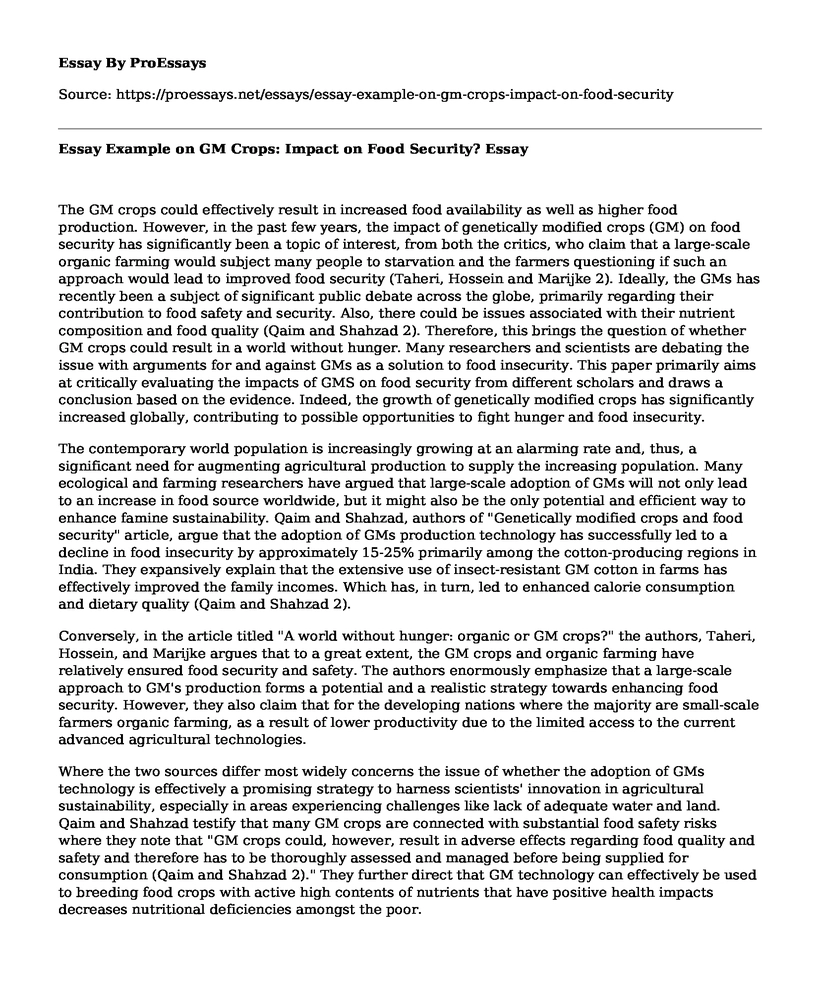The GM crops could effectively result in increased food availability as well as higher food production. However, in the past few years, the impact of genetically modified crops (GM) on food security has significantly been a topic of interest, from both the critics, who claim that a large-scale organic farming would subject many people to starvation and the farmers questioning if such an approach would lead to improved food security (Taheri, Hossein and Marijke 2). Ideally, the GMs has recently been a subject of significant public debate across the globe, primarily regarding their contribution to food safety and security. Also, there could be issues associated with their nutrient composition and food quality (Qaim and Shahzad 2). Therefore, this brings the question of whether GM crops could result in a world without hunger. Many researchers and scientists are debating the issue with arguments for and against GMs as a solution to food insecurity. This paper primarily aims at critically evaluating the impacts of GMS on food security from different scholars and draws a conclusion based on the evidence. Indeed, the growth of genetically modified crops has significantly increased globally, contributing to possible opportunities to fight hunger and food insecurity.
The contemporary world population is increasingly growing at an alarming rate and, thus, a significant need for augmenting agricultural production to supply the increasing population. Many ecological and farming researchers have argued that large-scale adoption of GMs will not only lead to an increase in food source worldwide, but it might also be the only potential and efficient way to enhance famine sustainability. Qaim and Shahzad, authors of "Genetically modified crops and food security" article, argue that the adoption of GMs production technology has successfully led to a decline in food insecurity by approximately 15-25% primarily among the cotton-producing regions in India. They expansively explain that the extensive use of insect-resistant GM cotton in farms has effectively improved the family incomes. Which has, in turn, led to enhanced calorie consumption and dietary quality (Qaim and Shahzad 2).
Conversely, in the article titled "A world without hunger: organic or GM crops?" the authors, Taheri, Hossein, and Marijke argues that to a great extent, the GM crops and organic farming have relatively ensured food security and safety. The authors enormously emphasize that a large-scale approach to GM's production forms a potential and a realistic strategy towards enhancing food security. However, they also claim that for the developing nations where the majority are small-scale farmers organic farming, as a result of lower productivity due to the limited access to the current advanced agricultural technologies.
Where the two sources differ most widely concerns the issue of whether the adoption of GMs technology is effectively a promising strategy to harness scientists' innovation in agricultural sustainability, especially in areas experiencing challenges like lack of adequate water and land. Qaim and Shahzad testify that many GM crops are connected with substantial food safety risks where they note that "GM crops could, however, result in adverse effects regarding food quality and safety and therefore has to be thoroughly assessed and managed before being supplied for consumption (Qaim and Shahzad 2)." They further direct that GM technology can effectively be used to breeding food crops with active high contents of nutrients that have positive health impacts decreases nutritional deficiencies amongst the poor.
Taheri and colleagues, for this part, claim that although the growth of GMs has extensively been adopted throughout the world, it poses various significant economic and environmental risks that are further worsened by the lack of sufficient management and assessment strategies in most developing countries. As such, they note that "many of the developing nation's governments have not provided the farmers with the permit to enhance in GMs growing as a result of the concerns associated with the biological safety (Taheri, Hossein and Marijke 5)." However, they suggest that strict labeling and traceability of all the GM produced crops can significantly help manage such risks.
Conclusion
Overall, it is apparent that the GMs are an essential component for a great food security strategy. The nutritional benefits also associated with the GMs make them more appropriate in enhancing food safety. The GM crops may, therefore, not be considered as a potential solution to eradicate hunger sustainability, but they are enormously a crucial component in the implementation of food security strategy.
Works Cited
Qaim, Matin, and Shahzad Kouser. "Genetically modified crops and food security." PloS one 8.6 (2013).: 1-7. doi: 10.1371/journal.pone.0064879
Taheri, Fatemeh, Hossein Azadi, and Marijke D'Haese. "A world without hunger: organic or GM crops?" Sustainability 9.4 (2017): 2-17. https://doi.org/10.3390/su9040580
Cite this page
Essay Example on GM Crops: Impact on Food Security?. (2023, Apr 05). Retrieved from https://proessays.net/essays/essay-example-on-gm-crops-impact-on-food-security
If you are the original author of this essay and no longer wish to have it published on the ProEssays website, please click below to request its removal:
- Paper Example on Apple Innovation Strategy
- Parkinson's Disease Essay
- The Role of Various Growth Factors in Preventing the Schwann Cell Impairment in Surgical Peripheral Nerve Repair
- Essay Sample on Benner's Theory of Nursing
- Reforms Impacting Public Sector Unions: Effects on Employees, Employers & Taxpayers - Essay Sample
- Exploring Serotonin Syndrome: Antidepressant Drug-Drug Interactions - Essay Sample
- Essay Example on Home Health Care: Guidance, Counseling & Hospice Services







